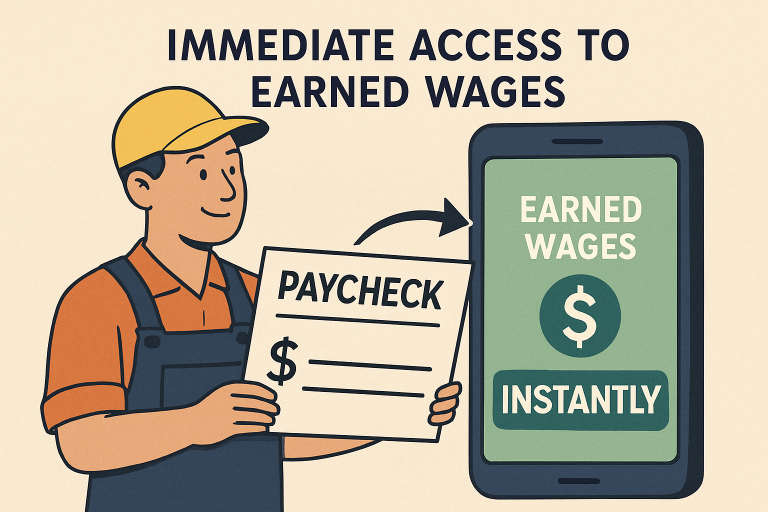Understanding Earned Wage Access
The traditional bi-weekly or monthly paycheck, once a standard of employment, is now being questioned by a workforce that often needs more immediate financial solutions. Earned Wage Access (EWA) provides a modern alternative, allowing employees to collect a portion of their income as soon as they earn it, rather than waiting for the end-of-month payday. Through earned wage access providers, workers today can address urgent needs and improve their overall financial stability by tapping into their earned but unpaid wages.
This approach aims to bridge the gap between earned wages and actual pay receipt, which can be critical during unexpected life events—medical emergencies, car repairs, or shortfalls in monthly bills. EWA is championed as a tool not just for financial convenience but for empowering workers to make proactive and timely decisions about their money.
The Rise of EWA Services
The rising demand for on-demand pay has fueled rapid growth in Earned Wage Access (EWA) services across multiple industries. Employees increasingly want more control over when and how they receive their wages, rather than waiting for traditional pay cycles. Market data highlights this shift: in 2020, workers accessed more than $9.5 billion in earned wages early, compared to just $3.2 billion in 2018. This significant increase reflects a growing preference for financial flexibility and autonomy in managing day-to-day expenses.
Employers in key sectors such as retail, hospitality, and healthcare have responded by adopting EWA programs to meet workforce expectations. Beyond addressing employee financial well-being, these benefits strengthen organizations’ ability to attract and retain talent in a competitive labor market. Companies offering EWA often report higher employee satisfaction and reduced turnover, proving that financial flexibility has become a cornerstone of modern workforce benefits and long-term organizational resilience.

Benefits of Earned Wage Access
Financial Flexibility
One of EWA’s greatest strengths is its ability to provide immediate relief without resorting to high-interest debt. Workers can withdraw a portion of their earned wages to manage emergencies or bridge gaps between paychecks. This agility is particularly valuable for households living paycheck to paycheck, giving them the breathing room to navigate financial bumps.
Reduced Reliance on Predatory Lending
EWA reduces reliance on expensive and sometimes predatory financial products by offering an alternative to payday loans and credit cards. With payday loan APRs often exceeding 300%, even a small EWA fee is far more manageable for most workers.
Employer Advantages
Employers who offer EWA are seeing tangible benefits in workforce satisfaction and retention. Employees are more likely to stay with an employer who demonstrates care for their financial well-being, which, in turn, helps reduce costly turnover.
Potential Drawbacks and Considerations
While the advantages of EWA are significant, users and employers must also weigh potential disadvantages:
- Fees and Accumulating Costs: Some EWA providers charge transaction fees or restrict the number of allowed withdrawals. Regular use can add up, impacting take-home pay over time.
- Regulatory Hurdles: The regulatory landscape for EWA is evolving. The Consumer Financial Protection Bureau (CFPB) has clarified that EWA products are subject to the same consumer lending laws as other financial products, creating compliance considerations for providers and employers.
- Dependency Risks: Workers who frequently rely on early wage access might develop a cycle dependent on immediate paychecks, making it difficult to break free from paycheck-to-paycheck living.
Employer Perspectives on EWA
The employer’s view of EWA is largely positive, with many companies embracing it as a forward-thinking employee benefit. A recent survey highlighted that 71% of mid-sized organizations already provide EWA, and another 24% expect to launch programs soon. For employers, EWA is less about payroll convenience and more about supporting workers—boosting morale, job satisfaction, and loyalty in the process.
Leading employers have found that offering EWA can be a point of differentiation in recruitment, particularly in industries with intense competition for hourly talent. Workers express higher appreciation for employers who understand their day-to-day financial obstacles, directly influencing retention and workplace culture.
Regulatory Landscape
The expansion of EWA has triggered careful scrutiny from regulatory bodies. In recent guidance, the CFPB underscored the importance of transparency in EWA terms, highlighting that paycheck advance services must operate within the confines of federal lending regulations. Providers and employers are encouraged to review agreements and program features closely to avoid violating compliance requirements.
As more states explore legislation specific to EWA, the industry will likely become more standardized, emphasizing protecting workers and ensuring fair terms. Clear disclosures, limits on fees, and robust data security protocols are emerging as best practices across reputable EWA providers.
Conclusion
Earned Wage Access (EWA) is reshaping traditional payroll systems by giving employees faster, more flexible access to the money they’ve already earned. Instead of waiting for fixed pay cycles, workers can tap into their wages as needed, helping them cover unexpected expenses, manage emergencies, or simply smooth out daily budgeting challenges. This financial flexibility can reduce reliance on high-interest credit options or payday loans, promoting greater financial stability. For employers, offering EWA can boost recruitment, retention, and overall employee satisfaction by demonstrating responsiveness to modern financial needs. However, it is essential to approach EWA with caution. Potential fees, compliance with regulatory standards, and ensuring responsible usage must all be considered to prevent unintended financial strain. As the nature of work evolves and employees increasingly demand speed, transparency, and control, EWA stands out as a powerful innovation supporting individual empowerment and organizational competitiveness.






